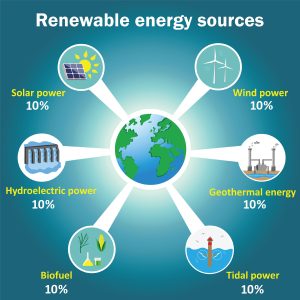Innovative Policies Driving Change Innovative policies have been pivotal in driving change across the globe in the realm of renewable energy. Countries worldwide have recognized the urgent need to transition from fossil fuels to cleaner energy sources, and innovative policies have been central to this transformation. These policies have ranged from subsidies and tax incentives
Innovative Policies Driving Change

Image by : Yandex
Innovative policies have been pivotal in driving change across the globe in the realm of renewable energy. Countries worldwide have recognized the urgent need to transition from fossil fuels to cleaner energy sources, and innovative policies have been central to this transformation. These policies have ranged from subsidies and tax incentives for renewable energy projects to stringent regulations on carbon emissions. For instance, the European Union’s Green Deal aims to make Europe the first climate-neutral continent by 2050, setting a high bar with its comprehensive policy framework. Similarly, China’s Renewable Energy Law has significantly accelerated the deployment of wind and solar power, making China a global leader in renewable energy capacity. These examples underscore the critical role that forward-thinking policies play in shaping a sustainable energy future.
Success stories abound when examining global efforts in renewable energy policies. Germany’s Energiewende, or energy transition, is a case in point. This ambitious policy initiative has propelled Germany to the forefront of renewable energy adoption, with the country now generating over 40% of its electricity from renewable sources. Another notable success story is Denmark, which has leveraged policy frameworks to become a global leader in wind energy. Denmark’s commitment to renewable energy is exemplified by its goal to phase out coal by 2030 and achieve 100% renewable electricity by 2050. These success stories highlight how robust policy frameworks can drive significant advancements in renewable energy adoption and set benchmarks for other nations to follow.
Community-Driven Renewable Projects
Empowering local communities through global renewable efforts has proven to be an effective strategy in promoting sustainable energy practices. Grassroots initiatives and community-driven projects have emerged as powerful tools in the global renewable energy movement. By involving local communities in renewable energy projects, these initiatives not only foster a sense of ownership and responsibility but also ensure that the benefits of renewable energy are distributed equitably. In countries like India, community solar projects have provided electricity to remote villages, transforming lives and boosting local economies. Similarly, in Africa, community-led microgrid projects have brought clean energy to off-grid areas, enhancing access to electricity and improving living standards. These examples illustrate the transformative impact of community-driven renewable projects on local communities.
International collaboration enhances community-driven renewable projects by pooling resources, expertise, and best practices from around the world. Collaborative efforts between governments, non-governmental organizations, and private sector entities have facilitated the implementation of community-driven renewable projects on a larger scale. For instance, the Global Environment Facility (GEF) has partnered with various countries to support community-based renewable energy projects, providing technical assistance and funding to ensure their success. Additionally, international organizations like the United Nations Development Programme (UNDP) have played a crucial role in fostering cross-border collaborations that enhance the effectiveness of community-driven renewable initiatives. These collaborative efforts underscore the importance of international cooperation in scaling up community-driven renewable projects and achieving global sustainability goals.
Corporate Giants Embracing Sustainability

Image by : Ynadex
Corporate giants are increasingly leading global renewable efforts, recognizing the dual benefits of sustainability and business growth. Major corporations across various industries have committed to ambitious renewable energy targets, investing heavily in clean energy projects and integrating sustainability into their core business strategies. Companies like Google, Apple, and Amazon have made significant strides in transitioning to 100% renewable energy for their operations, setting an example for other businesses to follow. Google’s commitment to renewable energy is particularly noteworthy, with the company achieving its goal of matching 100% of its global electricity consumption with renewable energy purchases in 2017. These corporate giants’ proactive approach to sustainability is driving substantial progress in the global renewable energy landscape.
Sustainability initiatives by global corporations have yielded numerous success stories, demonstrating the tangible benefits of embracing renewable energy. For instance, IKEA’s investment in wind and solar energy has enabled the company to produce more renewable energy than it consumes, significantly reducing its carbon footprint. Similarly, Unilever’s Sustainable Living Plan has led to a 50% reduction in the company’s greenhouse gas emissions from its operations while simultaneously driving business growth. These success stories highlight how corporate sustainability initiatives can deliver both environmental and economic benefits, reinforcing the case for businesses to prioritize renewable energy in their strategies.
Technological Breakthroughs in Clean Energy
Global efforts in solar energy advancements have led to remarkable technological breakthroughs, driving down costs and increasing efficiency. Innovations in photovoltaic (PV) technology, such as the development of perovskite solar cells and bifacial solar panels, have significantly enhanced the performance and affordability of solar energy systems. Countries like the United States, China, and Japan have been at the forefront of these advancements, investing heavily in research and development to push the boundaries of solar technology. As a result, the cost of solar energy has plummeted, making it one of the most competitive sources of electricity globally. These technological breakthroughs are pivotal in accelerating the adoption of solar energy and achieving global renewable energy targets.
Wind power technology success stories worldwide demonstrate the potential of wind energy to contribute significantly to the global energy mix. Advances in turbine design, materials, and offshore wind technology have led to substantial improvements in the efficiency and capacity of wind power systems. Denmark’s pioneering efforts in offshore wind energy have set a benchmark, with the country achieving record-breaking wind power generation. Similarly, the United Kingdom’s investment in offshore wind farms has positioned it as a global leader in wind energy capacity. These success stories underscore the importance of continuous innovation and investment in wind power technology to harness its full potential and drive the global transition to renewable energy.
International Collaborations for a Greener Future
Global efforts in renewable energy showcase numerous success stories that highlight the power of international collaborations. Cross-border partnerships and collaborative projects have played a crucial role in advancing renewable energy initiatives and driving sustainable development. For instance, the International Solar Alliance (ISA), a coalition of over 120 countries, aims to promote solar energy deployment worldwide through collective action and knowledge sharing. The ISA’s collaborative efforts have facilitated the implementation of large-scale solar projects in member countries, contributing to global renewable energy capacity. Another notable example is the Clean Energy Ministerial (CEM), which brings together governments and industry leaders to accelerate the transition to clean energy through collaborative initiatives. These success stories illustrate how international collaborations can amplify the impact of renewable energy efforts and foster a greener future.
Collaborative projects highlight global efforts for a greener future by leveraging the strengths and resources of multiple stakeholders. Joint ventures between countries, international organizations, and private sector entities have resulted in groundbreaking renewable energy projects that drive significant environmental and economic benefits. The Desertec initiative, for example, aims to harness the vast solar energy potential of the Sahara Desert to supply clean electricity to Europe, the Middle East, and North Africa. This ambitious project exemplifies the potential of collaborative efforts to address global energy challenges and promote sustainable development. Such collaborative projects are essential in achieving global renewable energy targets and ensuring a sustainable future for all.
Economic Benefits of Renewable Initiatives
Global efforts in renewable energy have created millions of green jobs worldwide, driving economic growth and fostering sustainable development. The renewable energy sector has emerged as a significant source of employment, with jobs spanning manufacturing, installation, maintenance, and research and development. The International Renewable Energy Agency (IRENA) estimates that the renewable energy sector employed over 11 million people globally in 2018, with solar PV and wind energy being the largest employers. Countries like China, the United States, and Germany have seen substantial job creation in the renewable energy sector, contributing to economic resilience and social well-being. These job creation figures underscore the economic benefits of renewable initiatives and their potential to drive inclusive growth.
Renewable initiatives boost global economic resilience and growth by reducing dependence on fossil fuels and enhancing energy security. The transition to renewable energy has led to significant cost savings for countries by mitigating the volatility of fossil fuel prices and reducing the negative externalities associated with fossil fuel consumption. Additionally, investments in renewable energy infrastructure stimulate economic activity and attract private sector investment, further driving economic growth. Countries that have embraced renewable energy, such as Costa Rica and Iceland, have reaped the economic benefits of reduced energy costs and increased energy independence. These examples highlight how renewable initiatives can enhance global economic resilience and contribute to sustainable development.
Education and Awareness Campaigns

Image by : Yandex
Highlighting global efforts in renewable education and awareness campaigns is crucial in fostering a culture of sustainability and driving the adoption of renewable energy. Education and awareness initiatives play a vital role in informing the public about the benefits of renewable energy and encouraging behavioral change. Governments, non-governmental organizations, and educational institutions worldwide have launched various campaigns to raise awareness about renewable energy and its importance in combating climate change. For instance, the United Nations’ Sustainable Energy for All (SEforALL) initiative aims to ensure universal access to sustainable energy by 2030 through education and advocacy efforts. These campaigns are essential in building public support for renewable energy policies and initiatives.
Showcasing success stories from global renewable efforts in education underscores the impact of awareness campaigns in driving renewable energy adoption. Educational programs and awareness campaigns have inspired individuals and communities to embrace renewable energy solutions and contribute to sustainability efforts. For example, the Solar Schools initiative in Australia has empowered schools to install solar panels, reducing their carbon footprint and educating students about renewable energy. Similarly, the Energy Education Program in the United States has provided teachers with resources and training to incorporate renewable energy topics into their curricula, fostering a new generation of environmentally conscious citizens. These success stories highlight the transformative power of education and awareness campaigns in promoting renewable energy and achieving global sustainability goals.
















